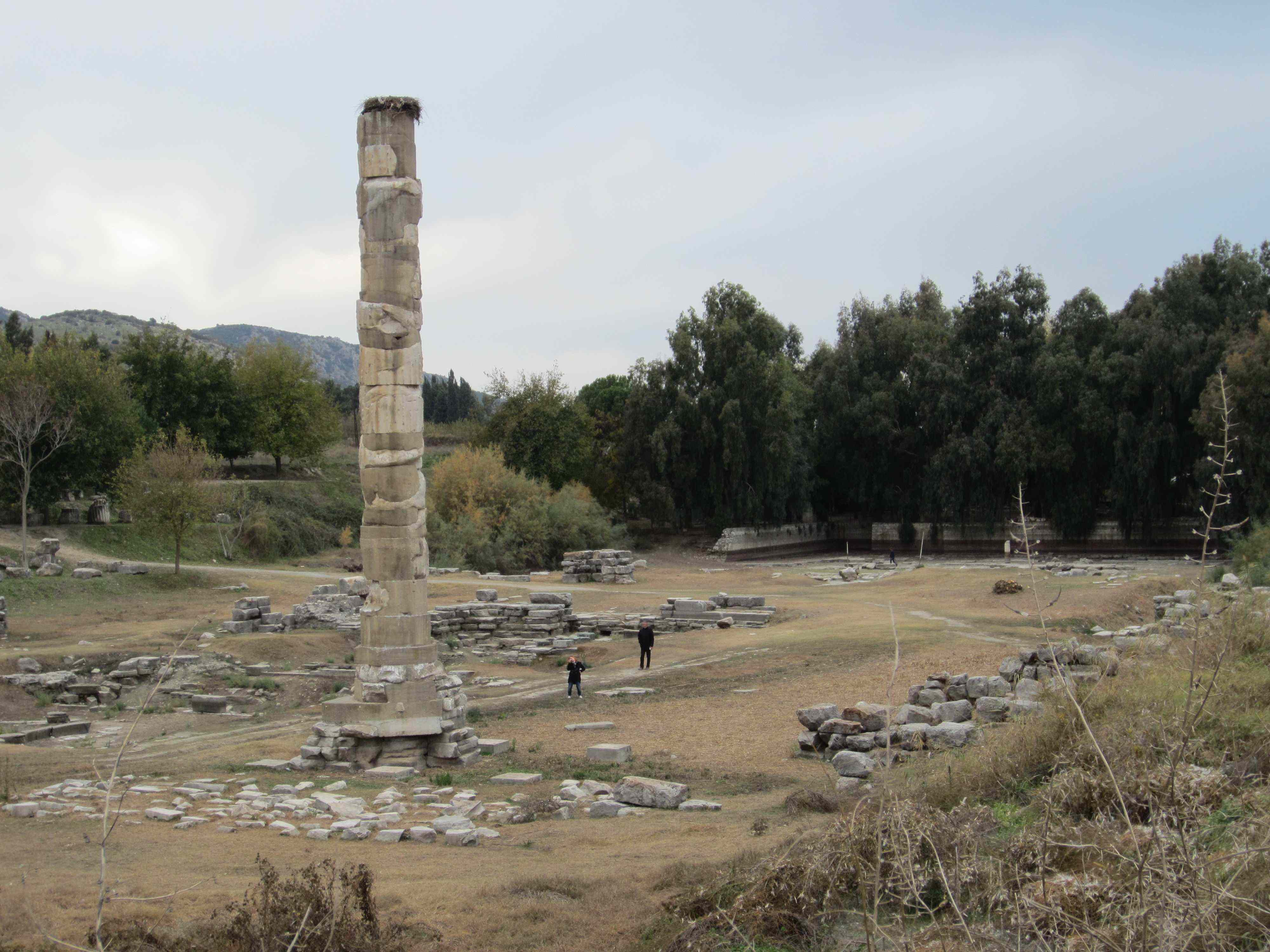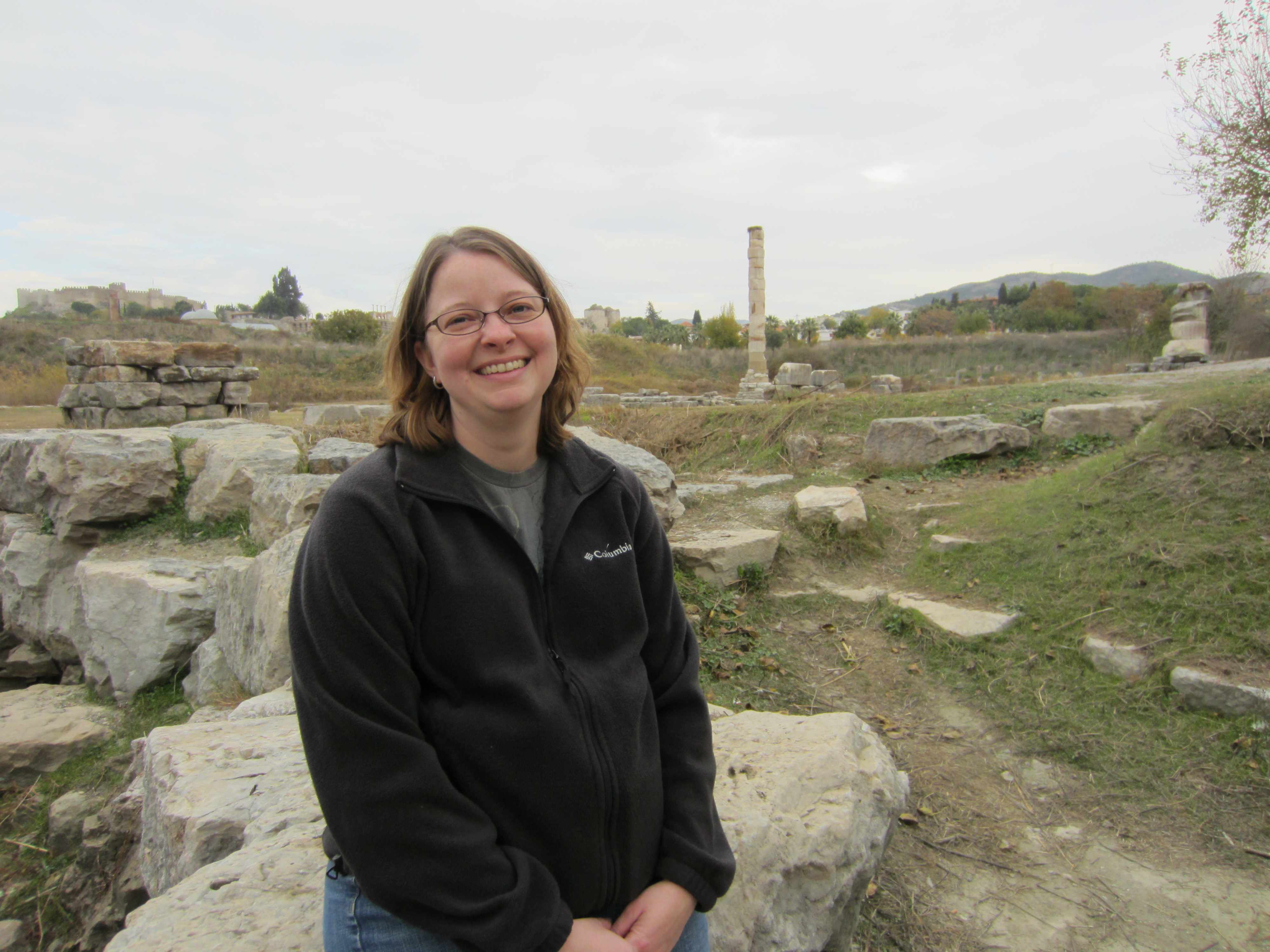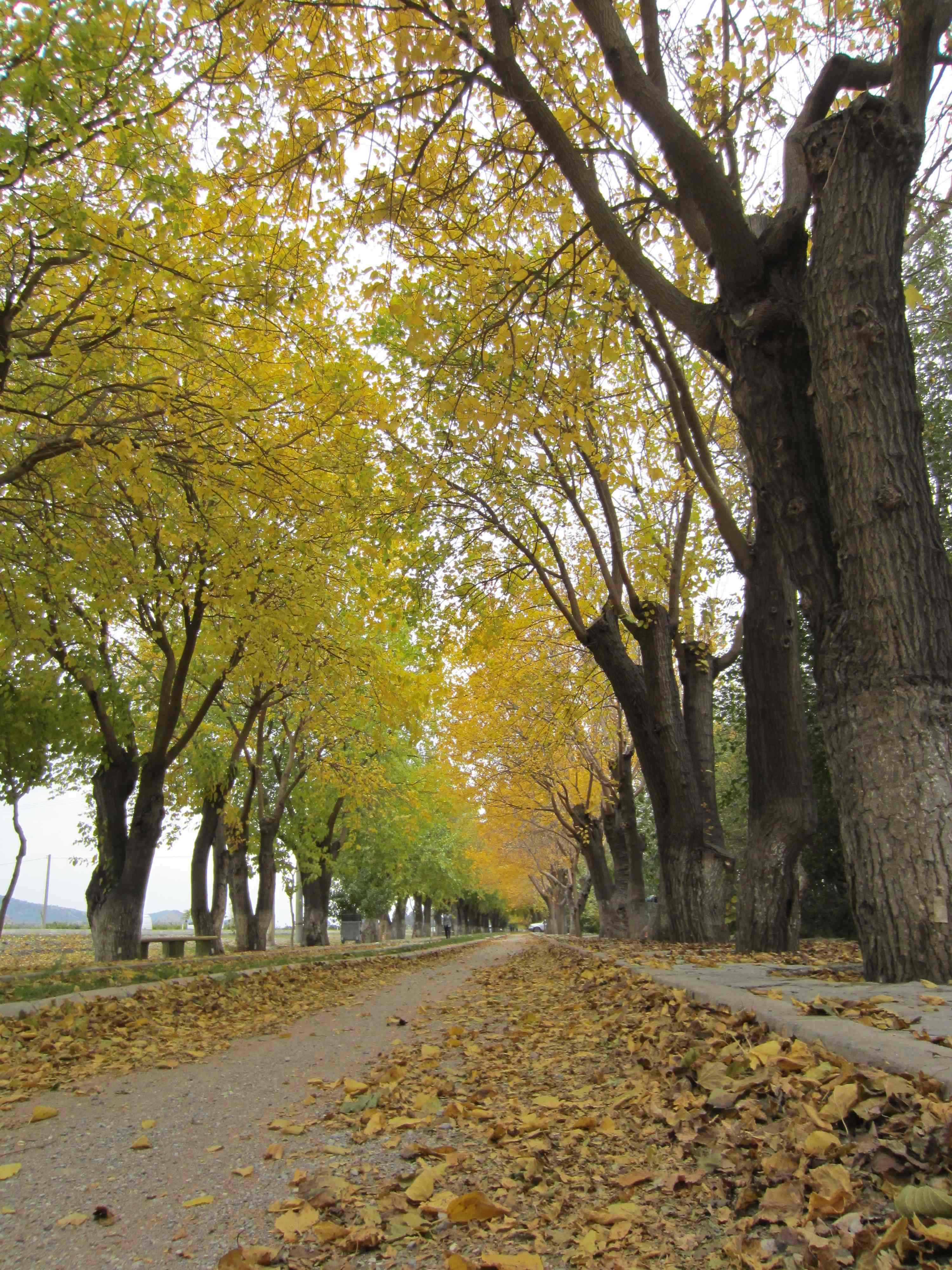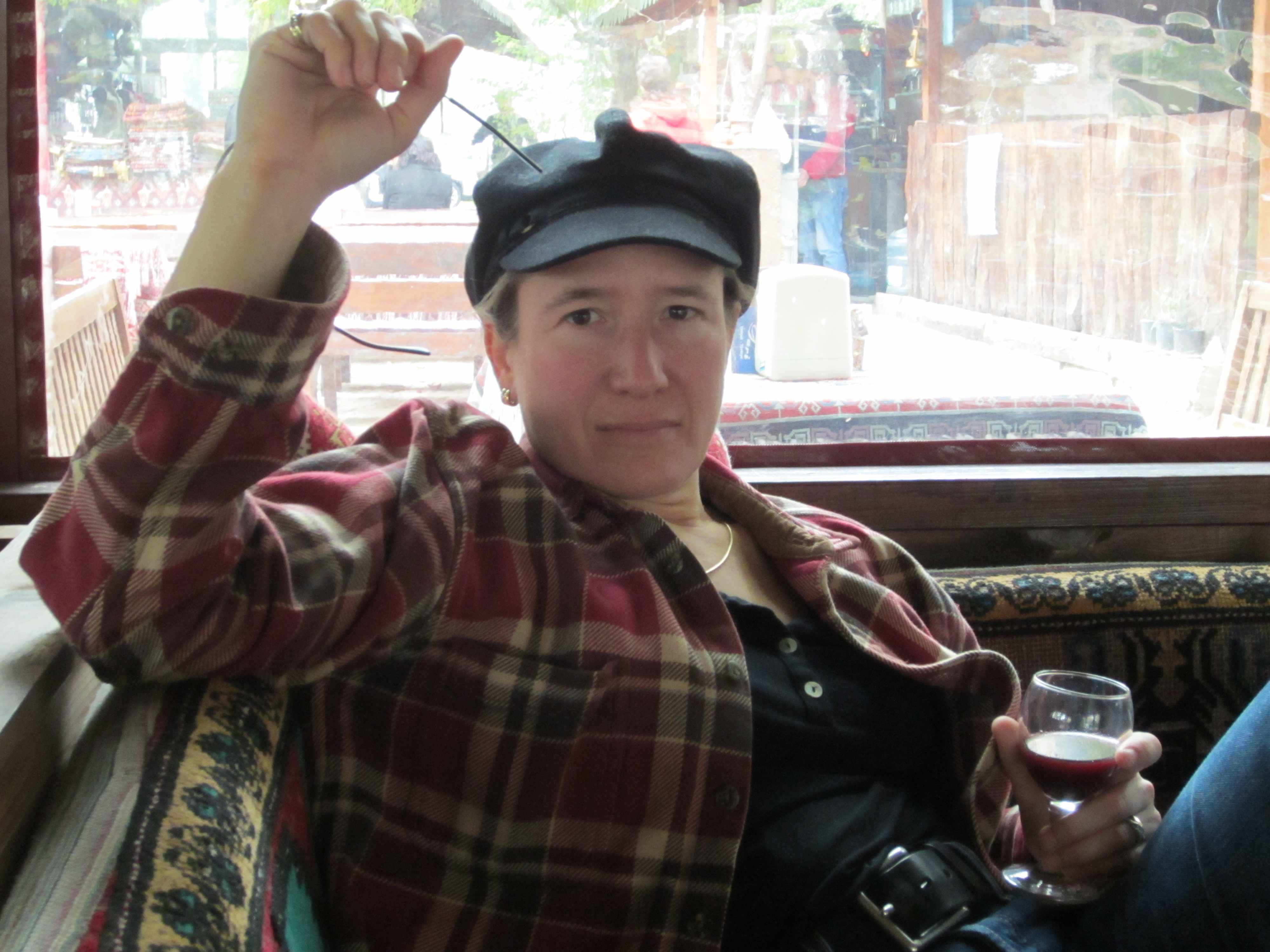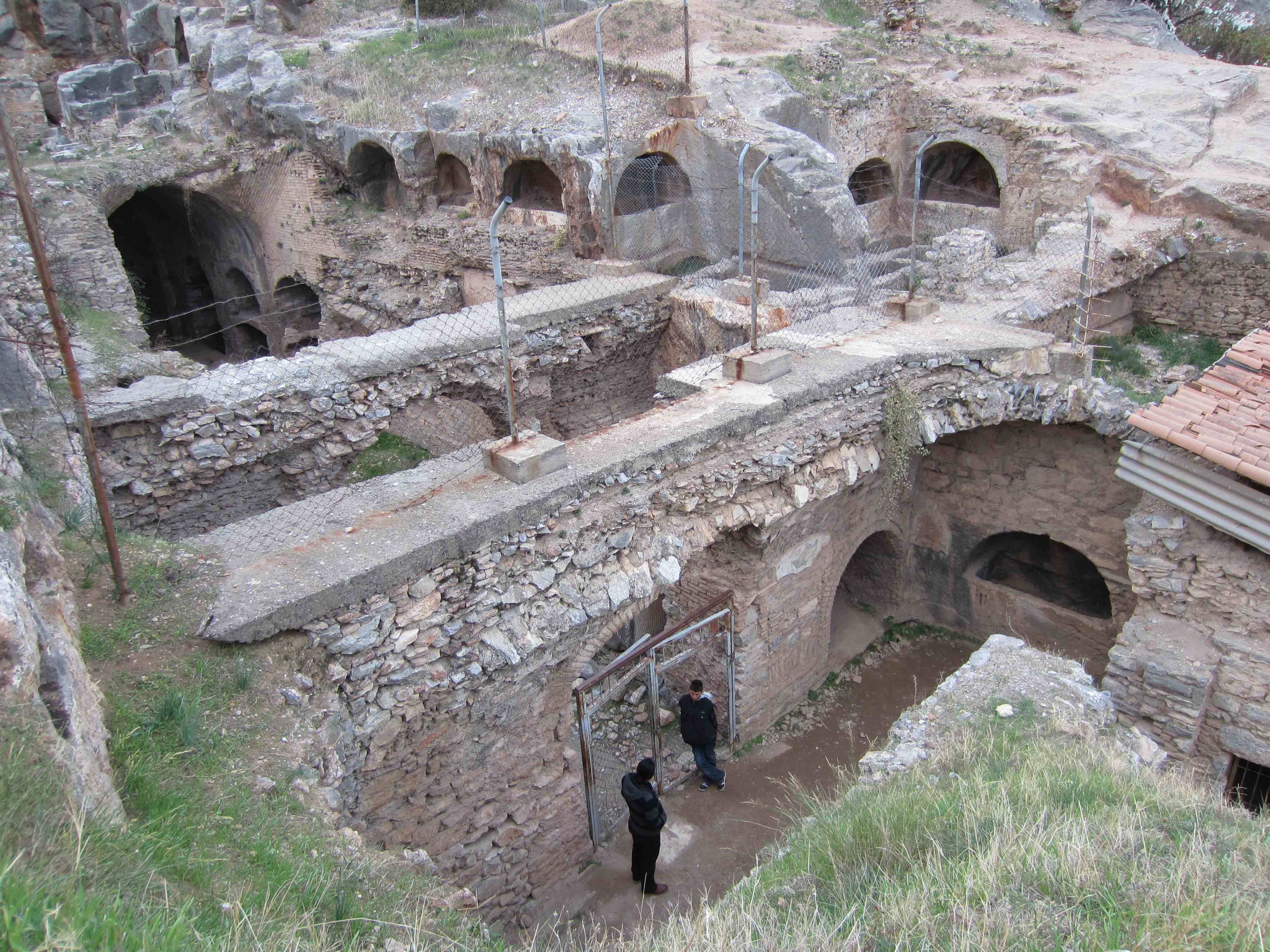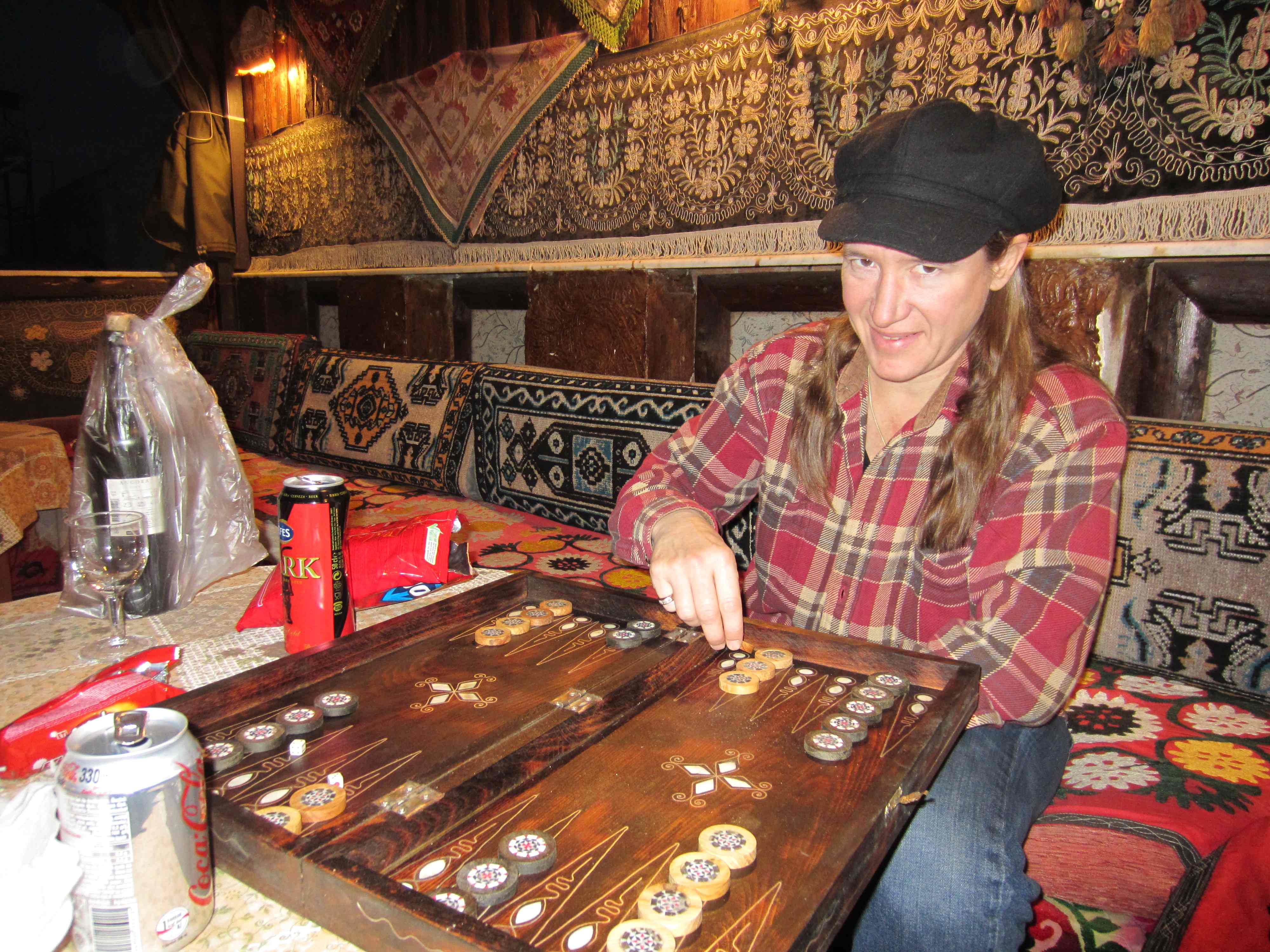selçuk and almost ephesus
By diana on Nov 15, 2011 | In talking türkiye
PRONUNCIATION KEY:
Efes: EH-fess
Selçuk: SELL-chuk
Şirince: shur-ENJ-eh
Kuşadası: koo-SHAH-dah-suh
Mich arrived from the States last Sunday evening, and proceeded to deal with jet lag. There are a few places we want to visit while she's here, but we decided to not begin the extra-Izmir touring until she had settled in a bit. The first site of interest was fairly close: Ephesus.*
* Local name, Efes. There's a very popular and quite good local beer named after it. Oh and, something something Apostle Paul something.
We have no car, but Selçuk—the tourist trap attached to Ephesus—is reachable via Izmir city transport, so it couldn't be far. I dinked around with the city bus website trying to find a decent route to Selçuk, but quit in frustration. Last Wednesday, when Mich and I went to the BX, I asked Bahar—a Turkish friend who sells carpets here—how best to get to Selçuk, and she said, “Rent a car.” When I suggested that there may be a better way to get there, like a bus or train, she said there was no train and insisted that renting a car was the way to go, since this meant we wouldn't be at the mercy of someone else's schedule.* She waxed eloquent about the other places we could and should visit while we were there, which we'd need a car for: we should slip into Şirince, a town in the hills about 6 km from Selçuk, to try their fruit wine (these people will apparently make wine out of anything). And of course, we should spend the night in Kuşadası, the nearby seaside resort. She suggested we not stay in Selçuk itself, since “there's not really anything there.”
* In all fairness, she seems to have been confusing a city bus with a tour bus, which...ugh.
I nodded, thanked her for her advice, then asked some coworkers the next day over lunch. They also recommended I rent a car, or even shamelessly hitch a ride with someone I know who has a car. I nodded again and thanked them for their advice.
I was, however, convinced that there was a better way to do it. This is odd, considering my upbringing where a person without a car may as well be a person without legs, but I guess my commute to Boulder over the last couple of years forever changed the way I view public transportation. Why in the name of all that's holy would I want to rent a car (to the tune of 70TL or more per day), then have to work out a driving route to Ephesus—almost everyone here has a GPS which they take for granted, which I don't have and would cost me even more, of course—then find and pay for parking, and pay through the nose for gasoline...when I could just take a city bus for less than a buck, read a book en route, and not have to brave Turkish drivers?
I was having trouble working out a bus route, though. I finally asked Mich to do a little research, and within about ten minutes (of course), she pointed out that there is, in fact, a train that would deliver us to Selçuk, and it would cost us five and a half TL apiece (about six bucks, all told). The trip was a bit over an hour, through the Turkish countryside. Thus it was that two days ago, we tossed some cash, a couple of books, a toothbrush, and a change of underwear into backpacks, walked down the hill to the Metro, took it to the main train station (all told, about 15 minutes from the house), and got on the train to Selçuk.
This is where my story would get funny or at least interesting if my ideas turned out to be poorly conceived, but I'm destined to disappoint you. The trip was quick and comfortable, and we disembarked just before lunch in the quaint little burg of Selçuk.
….Where we were immediately accosted by someone wanting to “help” us.
It invariably begins like this: “Hello. Where are you from?” This is just one of the ways they use your culture against you. They're betting you'll be too polite to ignore them, and you will be thankful that someone local speaks English and is friendly. They love it when you tell them you're American, because thi$ mean$ one thing to them, but I'm too polite to $ay just what.
So when we got off the train, we got our ready-made hello-where-are-you-from guy. I didn't make eye contact and walked right past. He followed. He said it again. I said, “I'm from I need a trash can.” I was holding an empty Red Bull can and I simply cannot bring myself to litter at will like the Turks do. He offered to take it for me. I held it and looked around for a trash can, ignoring him. He suggested I set it on the sidewalk around the corner; he was anxious to drag me off to someone's business or become my tour guide, of course. I found a trash can and deposited the can. He was still there, right at my elbow. “Where are you from?”
“I'm from I'm hungry.”*
* Occasionally, like when I'm bored or feeling unreasonably friendly, I respond politely to the incessant where-are-you-from conversation starters, but usually, I will either ignore them—which provokes the speaker to try other languages as I pass which can be amusing—or I respond with a pointed remark (like “I'm from piss off”), which may not be polite but is emotionally rewarding nonetheless. I swear, sellers here will walk into your path like love-starved cats then try to make you feel guilty for kicking them. I refuse to play.
He took me around the corner (10 feet) to a giant “YOU ARE HERE” sign.

He said the city center was right this way (he pointed), and there were places to eat there. I looked at the sign for a bit to get my bearings, then thanked him as though he were helping me out of the kindness of his heart, and we walked away.* He did not follow this time.
* This is a phenomenon Mich noticed: the hawkers/guides/local idiots pick me out as the target and pretty much ignore her. I'm jealous.
We meandered into the string of overpriced restaurants and selected one based on the fact that it offered wine with the meal. All else being equal, this seemed like as good a selection criterium as any. We purchased a pizza* and the Turkish form of tzatziki, along with a bottle of wine that the waiter offered for a mere 50TL. I told him it was too expensive, and to take it away. He insisted that during tourish season, this bottle went for 100 to 120TL. I said I didn't care. He offered it for 40TL then, and while it was still overpriced, I took it.
* This restaurant offered both an Italian pizza and a Turkish pizza. I asked the waiter what the difference was. He said none, really. One is round and the other is shaped like a football. :roll:
In the restaurant, I pulled out one of the tourist books to check our next move."Kuşadası," says Fodor's, "is a brash, highly touristy place replete with pubs, fish-and-chips restaurants, and tacky souvenir shops." The Lonely Planet* is even less encouraging, saying it is a "shameless" resort town catering to the cruise ship trade, chock full of cheap souvenirs, overpriced everything, and ultra-aggressive "Hi, where are you from" hawkers. We agreed that Kuşadası was a place to be strenuously avoided.
* An older, deliciously honest version. The current one has been toned down and is now Kuşadası-friendly, even though the town has no doubt not improved. Some money probably changed hands here.
So...we porked out on our pizza, which is quite Italian in that it doesn't go for the tomato sauce that Americans take for granted on their pizzas, and the tzatziki and the gratis fresh flatbread, paid handsomely for it (something like 60TL for the meal), dropped the last half of the bottle in a backpack, and emerged into the chill afternoon air to see what we could see.
And it is chilly. You'd think this would preclude the tourist glut, but not so much. Selçuk was pretty deserted, I'll give it that, but it seems that the tourists avoid this “move along, there's nothing to see here” place, which might be why we were perfectly happy to secure lodgings in a little inn just up the hill. It was the Homeros Pension and Guesthouse (it even had little busts of Homer over the door). The lady showed us a very nice room with a large bed, and asked for 40TL apiece for it. I said no. I suggested I would pay 50TL. She showed us a smaller room with a similar bed, but with the bathroom down the hall. I said ok.
Her English wasn't good, but she managed to suggest through gestures—finger writing “50” then zipping her mouth—that I wasn't to tell anyone that we were getting the room for 50TL. This isn't a compact, of course. They do this to reassure you that you're getting a great deal, and probably in the hopes that you'll tell people where you got a good room for a decent price. She took us to the rooftop bar area where she said something about wine at 6pm, then took us across the cobblestones to the dining room where dinner would be served for, of course, a small fee. We said teshekkuler, locked our stuff in the room, and struck out for the Temple of Artemis.
This is what's left of one of the Seven Wonders of the Ancient World: little more than a single column.
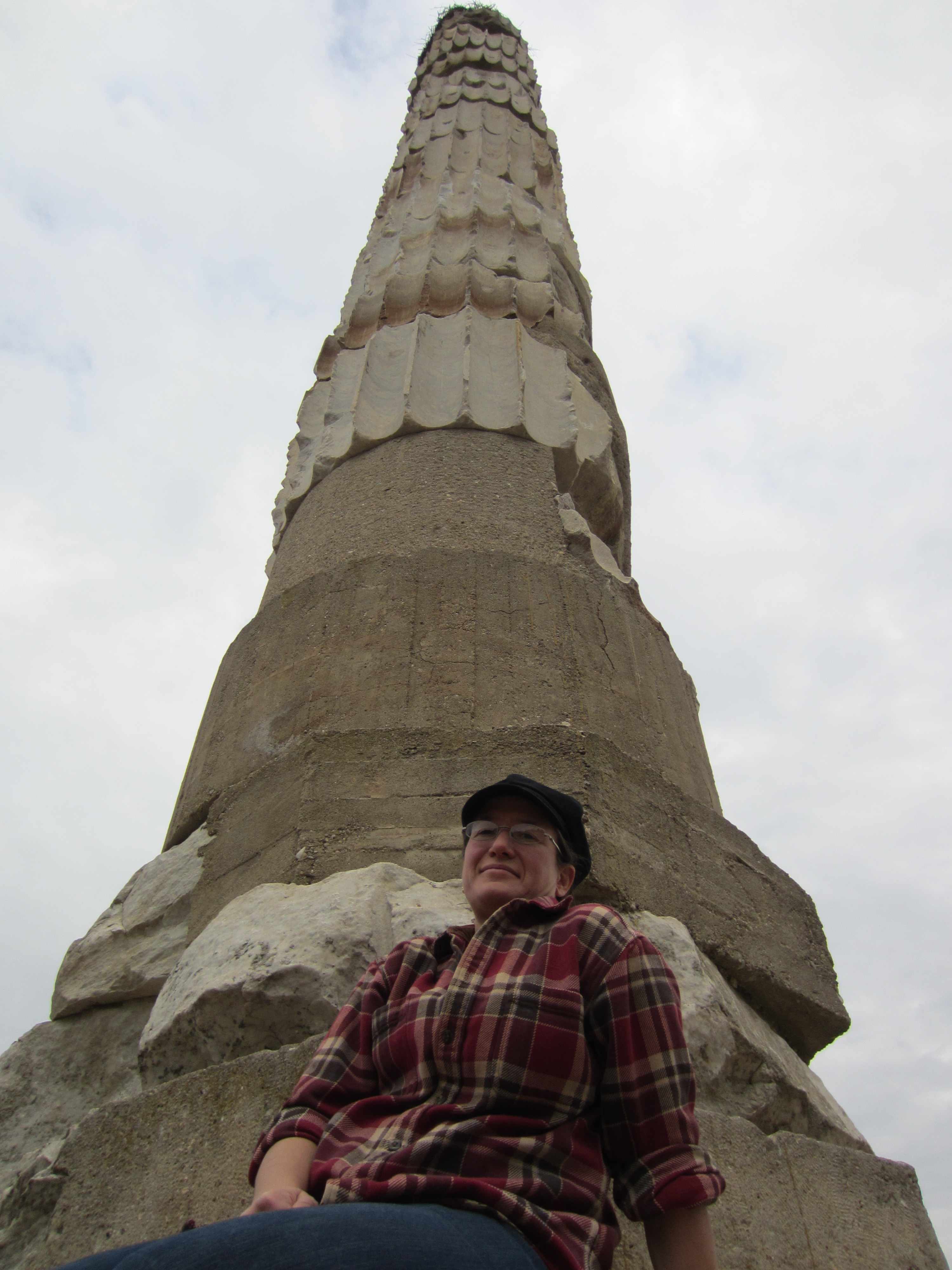
Objects in picture may be smaller than they appear. (And please, no erection jokes. We've already made them all and they weren't that funny.)
But there were lots of such columns, of course. Here's a view of the layout so you get a better idea of the scale.
When we walked onto the site, there were some bored hawkers hanging out on nearby ruins. We managed to hit the site between tour buses. They started in with the “Hi! Where are you from” shit immediately. I pretended I was deaf, not even deigning to look their way. After a while, I heard one say, “Thank you for not talking!” You're welcome.
Then we took pictures. Here's a gratuitous pic of Mich:
After the Temple of Artemis, we walked on toward Ephesus, which is less than 2 miles outside of Selçuk, along this lovely street that we'd have missed had we been encased in a vehicle.
We took the turn up toward Efes, then allowed ourselves to be drawn toward a nearby site known as the Grotto of the Seven Sleepers. The walk from the main drag to this “attraction” was a bit longer than we expected, so we paused for refreshments in a rather pleasant establishment.
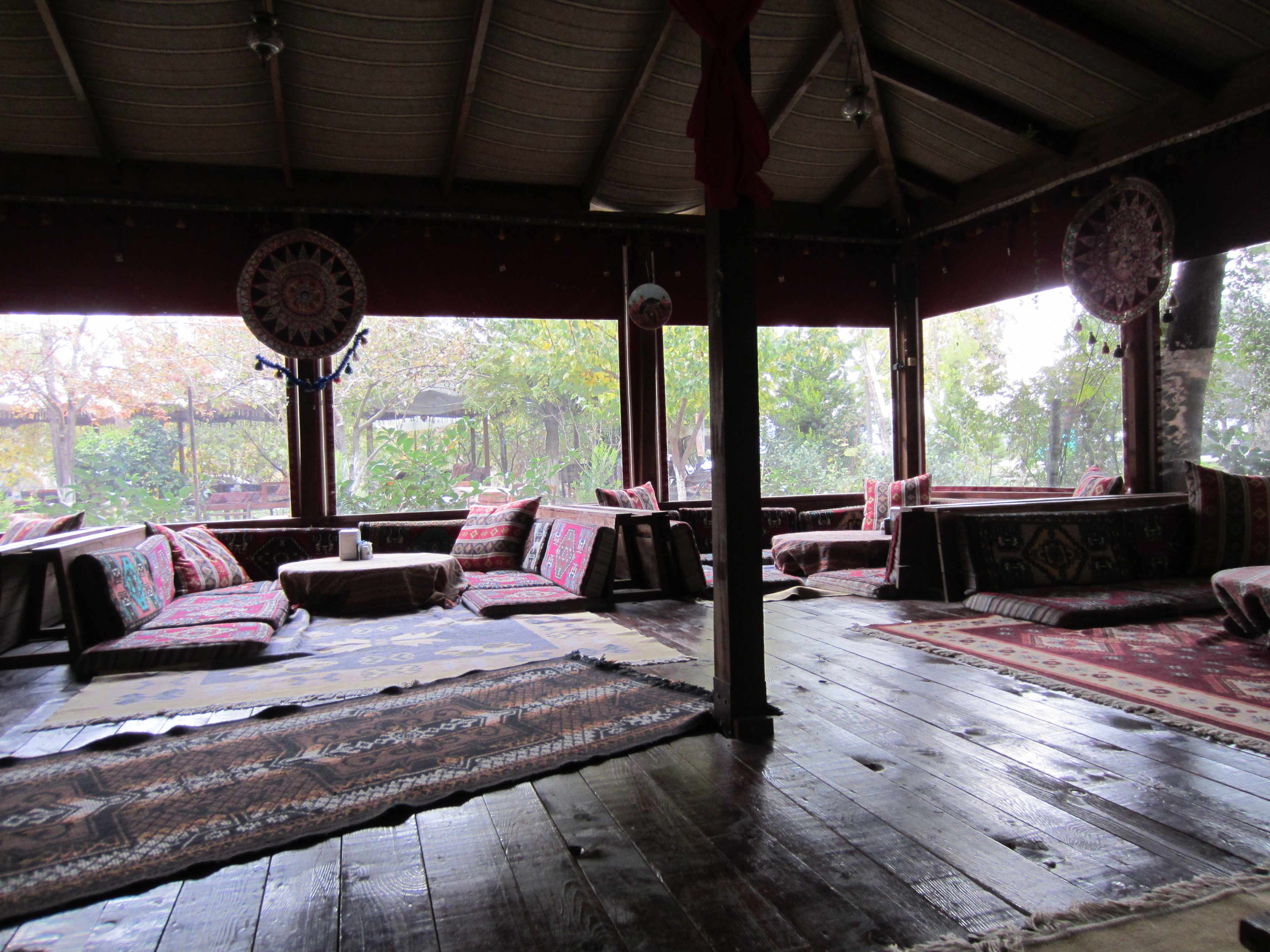
And here's the obligatory picture of me:
In re: The Grotto of the Seven Sleepers: legend has it that seven Christian friends hid out in a cave during 2nd century persecutions and the local king had them sealed into the cave. In the 4th century, a farmer (or earthquake) opened the cave and the men emerged and wandered into town, where they tried to purchase dinner with some very old coinage.
In Innocents Abroad, Mark Twain wrote a version of the story that was slightly more entertaining:
In the Mount of Pion, yonder, is the Cave of the Seven Sleepers. Once upon a time, about fifteen hundred years ago, seven young men lived near each other in Ephesus, who belonged to the despised sect of the Christians. It came to pass that the good King Maximilianus, (I am telling this story for nice little boys and girls,) it came to pass, I say, that the good King Maximilianus fell to persecuting the Christians, and as time rolled on he made it very warm for them. So the seven young men said one to the other, let us get up and travel. And they got up and traveled. They tarried not to bid their fathers and mothers good-bye, or any friend they knew. They only took certain moneys which their parents had, and garments that belonged unto their friends, whereby they might remember them when far away; and they took also the dog Ketmehr, which was the property of their neighbor Malchus, because the beast did run his head into a noose which one of the young men was carrying carelessly, and they had not time to release him; and they took also certain chickens that seemed lonely in the neighboring coops, and likewise some bottles of curious liquors that stood near the grocer’s window; and then they departed from the city.
By-and-by they came to a marvelous cave in the Hill of Pion and entered into it and feasted, and presently they hurried on again. But they forgot the bottles of curious liquors, and left them behind. They traveled in many lands, and had many strange adventures. They were virtuous young men, and lost no opportunity that fell in their way to make their livelihood. Their motto was in these words, namely, “Procrastination is the thief of time.” And so, whenever they did come upon a man who was alone, they said, Behold, this person hath the wherewithal — let us go through him. And they went through him. At the end of five years they had waxed tired of travel and adventure, and longed to revisit their old home again and hear the voices and see the faces that were dear unto their youth. Therefore they went through such parties as fell in their way where they sojourned at that time, and journeyed back toward Ephesus again. For the good King Maximilianus was become converted unto the new faith, and the Christians rejoiced because they were no longer persecuted. One day as the sun went down, they came to the cave in the Mount of Pion, and they said, each to his fellow, Let us sleep here, and go and feast and make merry with our friends when the morning cometh. And each of the seven lifted up his voice and said, It is a whiz. So they went in, and lo, where they had put them, there lay the bottles of strange liquors, and they judged that age had not impaired their excellence. Wherein the wanderers were right, and the heads of the same were level. So each of the young men drank six bottles, and behold they felt very tired, then, and lay down and slept soundly.
When they awoke, one of them, Johannes — surnamed Smithianus — said, We are naked. And it was so. Their raiment was all gone, and the money which they had gotten from a stranger whom they had proceeded through as they approached the city, was lying upon the ground, corroded and rusted and defaced. Likewise the dog Ketmehr was gone, and nothing save the brass that was upon his collar remained. They wondered much at these things. But they took the money, and they wrapped about their bodies some leaves, and came up to the top of the hill. Then were they perplexed. The wonderful temple of Diana was gone; many grand edifices they had never seen before stood in the city; men in strange garbs moved about the streets, and every thing was changed.
Johannes said, It hardly seems like Ephesus. Yet here is the great gymnasium; here is the mighty theatre, wherein I have seen seventy thousand men assembled; here is the Agora; there is the font where the sainted John the Baptist immersed the converts; yonder is the prison of the good St. Paul, where we all did use to go to touch the ancient chains that bound him and be cured of our distempers; I see the tomb of the disciple Luke, and afar off is the church wherein repose the ashes of the holy John, where the Christians of Ephesus go twice a year to gather the dust from the tomb, which is able to make bodies whole again that are corrupted by disease, and cleanse the soul from sin; but see how the wharves encroach upon the sea, and what multitudes of ships are anchored in the bay; see, also, how the city hath stretched abroad, far over the valley behind Pion, and even unto the walls of Ayassalook; and lo, all the hills are white with palaces and ribbed with colonnades of marble. How mighty is Ephesus become!
And wondering at what their eyes had seen, they went down into the city and purchased garments and clothed themselves. And when they would have passed on, the merchant bit the coins which they had given him, with his teeth, and turned them about and looked curiously upon them, and cast them upon his counter, and listened if they rang; and then he said, These be bogus. And they said, Depart thou to Hades, and went their way. When they were come to their houses, they recognized them, albeit they seemed old and mean; and they rejoiced, and were glad. They ran to the doors, and knocked, and strangers opened, and looked inquiringly upon them. And they said, with great excitement, while their hearts beat high, and the color in their faces came and went, Where is my father? Where is my mother? Where are Dionysius and Serapion, and Pericles, and Decius? And the strangers that opened said, We know not these. The Seven said, How, you know them not? How long have ye dwelt here, and whither are they gone that dwelt here before ye? And the strangers said, Ye play upon us with a jest, young men; we and our fathers have sojourned under these roofs these six generations; the names ye utter rot upon the tombs, and they that bore them have run their brief race, have laughed and sung, have borne the sorrows and the weariness that were allotted them, and are at rest; for nine-score years the summers have come and gone, and the autumn leaves have fallen, since the roses faded out of their cheeks and they laid them to sleep with the dead.
Then the seven young men turned them away from their homes, and the strangers shut the doors upon them. The wanderers marveled greatly, and looked into the faces of all they met, as hoping to find one that they knew; but all were strange, and passed them by and spake no friendly word. They were sore distressed and sad. Presently they spake unto a citizen and said, Who is King in Ephesus? And the citizen answered and said, Whence come ye that ye know not that great Laertius reigns in Ephesus? They looked one at the other, greatly perplexed, and presently asked again, Where, then, is the good King Maximilianus? The citizen moved him apart, as one who is afraid, and said, Verily these men be mad, and dream dreams, else would they know that the King whereof they speak is dead above two hundred years agone.
Then the scales fell from the eyes of the Seven, and one said, Alas, that we drank of the curious liquors. They have made us weary, and in dreamless sleep these two long centuries have we lain. Our homes are desolate, our friends are dead. Behold, the jig is up — let us die. And that same day went they forth and laid them down and died. And in that self-same day, likewise, the Seven-up did cease in Ephesus, for that the Seven that were up were down again, and departed and dead withal. And the names that be upon their tombs, even unto this time, are Johannes Smithianus, Trumps, Gift, High, and Low, Jack, and The Game. And with the sleepers lie also the bottles wherein were once the curious liquors: and upon them is writ, in ancient letters, such words as these — Dames of heathen gods of olden time, perchance: Rumpunch, Jinsling, Egnog.
Such is the story of the Seven Sleepers, (with slight variations,) and I know it is true, because I have seen the cave myself.
(If you have not read this book, I cannot recommend it highly enough.)
Here's a pic of what's left of the cave.
Oh, and it's really a Byzantine necropolis. This explanation lacks the poetry of legend, but it's cool, nonetheless.
By this time, it was getting colder and dark was fast approaching, so we struck out across some orange orchards until we got back to town, where we settled into the upper loft of the hotel to play backgammon.
T'was cold, and one of the folk who ran the hostel came up after a bit to coax us into joining the main group in the breakfast room where it was allegedly warm. He helped Mich win then we gladly joined them, where he left to distort the game outcomes of other people and my luck turned. The establishment provided some gratis wine which was quite tasty (provided you had no sense of smell or taste), the warmth of a wood stove, and unlimited servings of inane American tourist “conversation,” where each traveling stranger tries to one-up their neighbor in a manner they hope is subtle but excruciatingly isn't.
In this part of the world, no one even mentions having been to Europe. Everybody has been to France and Germany and Austria, etc., so you automatically fall lower in the pecking order if you deign to mention such travels. Here--and I'm basing this entirely upon conversations we could not help but overhear--one name-drops Palestine and Egypt and complains about tour guides, ripoffs, and scams: “Well, when we were in Palestine last month, our tour guide....” This is delivered with utter nonchalance, as though you didn't even notice that most people dare not even dream of something you pretend to take for granted.
When we retired to bed, Mich and I played the one-up contest. She won with, “Your tour guide was that bad? Well, last week when I was in Antarctica....”
I'll wind up this segment with another Twain quote from Innocents Abroad:
The gentle reader will never, never know what a consummate ass he can become until he goes abroad. I speak now, of course, in the supposition that the gentle reader has not been abroad, and therefore is not already a consummate ass. If the case be otherwise, I beg his pardon and extend to him the cordial hand of fellowship and call him brother.
I'll get to work on the actual Ephesus piece shortly...and "shortly" can mean lots of things.
d
2 comments
Diana,
Love the hat. You could be the skipper of a freighter smuggling pistachos and antiquities wearing that.
Was the temple of Artemis a target of opportunity, or did you have a more personal reason for going? It occurs to me your namesake was the Romans’ manifestation of Artemis.
Thanks for the Twain. “These be bogus.” Love it!
Dave
Hi, Dave! :)
Thanks. I love this hat.
The temple of Artemis was, of course, de rigeur. It was, in fact, my original goal of the expedition–then I heard there were some cool ruins at Ephesus….
d
| « flds and teh gey | tips for a happy trip » |
